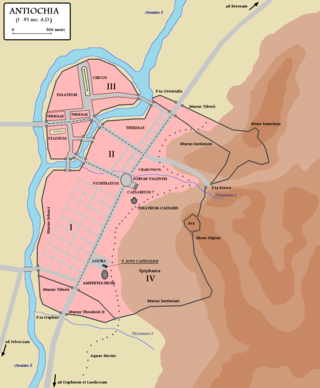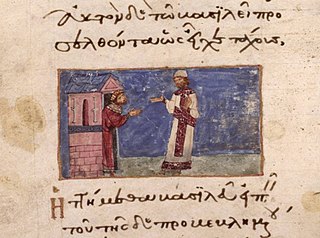Related Research Articles
Ammianus Marcellinus, occasionally anglicised as Ammian, was a Roman soldier and historian who wrote the penultimate major historical account surviving from antiquity. His work, known as the Res gestae, chronicled in Latin the history of Rome from the accession of the Emperor Nerva in 96 to the death of Valens at the Battle of Adrianople in 378, although only the sections covering the period 353 to 378 survive.

Constantius II was Roman emperor from 337 to 361. His reign saw constant warfare on the borders against the Sasanian Empire and Germanic peoples, while internally the Roman Empire went through repeated civil wars, court intrigues, and usurpations. His religious policies inflamed domestic conflicts that would continue after his death.

Julian was the Caesar of the West from 355 to 360 and Roman emperor from 361 to 363, as well as a notable philosopher and author in Greek. His rejection of Christianity, and his promotion of Neoplatonic Hellenism in its place, caused him to be remembered as Julian the Apostate in Christian tradition. He is sometimes referred to as Julian the Philosopher.
The 350s decade ran from January 1, 350, to December 31, 359.

Antioch on the Orontes was a Hellenistic Greek city founded by Seleucus I Nicator in 300 BC. It was one of the greatest and most important Greek cities of the Hellenistic period. The city served as the capital of the Seleucid Empire and later as regional capital to both the Roman and Byzantine Empire. During the Crusades, Antioch served as the capital of the Principality of Antioch, one of four Crusader states that were founded in the Levant. Its inhabitants were known as Antiochenes. The modern city of Antakya, in Hatay Province of Turkey, was named after the ancient city, which lies in ruins on the Orontes River and did not overlap in habitation with the modern city.

Valentinian I, sometimes called Valentinian the Great, was Roman emperor from 364 to 375. He ruled the Western half of the empire, while his brother Valens ruled the East. During his reign, he fought successfully against the Alamanni, Quadi, and Sarmatians, strengthening the border fortifications and conducting campaigns across the Rhine and Danube. His general Theodosius defeated a revolt in Africa and the Great Conspiracy, a coordinated assault on Roman Britain by Picts, Scoti, and Saxons. Valentinian founded the Valentinianic dynasty, with his sons Gratian and Valentinian II succeeding him in the western half of the empire.

Jovian was Roman emperor from June 363 to February 364. As part of the imperial bodyguard, he accompanied Emperor Julian on his campaign against the Sasanian Empire. Julian was killed in battle, and the exhausted and ill-provisioned army declared Jovian his successor. Unable to cross the Tigris, Jovian extricated his troops from enemy territory by making peace with the Sasanids on humiliating terms. He spent the rest of his eight-month reign traveling back to Constantinople. After his arrival at Edessa, Jovian was petitioned by bishops over doctrinal issues concerning Christianity. He died at Dadastana, never having reached the capital.

Flavius Claudius Constantius Gallus (326–354) was a statesman and ruler in the eastern provinces of the Roman Empire from 351 to 354, as Caesar under emperor Constantius II, his cousin. A grandson of emperor Constantius Chlorus and empress Flavia Maximiana Theodora, and a son of Julius Constantius and Galla, he belonged to the Constantinian dynasty. Born during the reign of his uncle Constantine the Great, he was among the few male members of the imperial family to survive the purge that followed Constantine's death. Under Constantius II, Gallus served as deputy emperor, based in Antioch and married to Constantius' sister Constantina. He dealt with a Jewish revolt in the years 351-352. Gallus ultimately fell out of favor with Constantius and was executed, being replaced as Caesar by his younger half-brother Julian.
Alypius may refer to:
Paulus Catena was a senior Roman public official who served as an investigator and notary for Constantius II during the mid-fourth century. He is principally known through the writings of Ammianus Marcellinus, though he is also present in the works of Libanius and Julian the Apostate. Marcellinus describes him as infamously cruel, and a skilled fabricator of false accusations.

The Battle of Ctesiphon took place on 29 May 363 between the armies of Roman Emperor Julian and an army of the Sasanian Empire outside the walls of the Persian capital Ctesiphon. The battle was a Roman victory, but eventually the Roman forces found themselves unable to continue their campaign as they were too far from their supply lines.
Ursicinus was a Roman senior military officer, holding the rank of Magister Equitum per Orientem and even Magister Peditum Praesentalis in the later Roman Empire c. 349–359. He was a citizen of Antioch and was well connected in the Eastern part of the Roman Empire.
Alypius of Alexandria was a Greek writer on music who flourished in the 4th century CE. Of his works, only a small fragment has been preserved, under the title of Introduction to Music.
The siege of Pirisabora took place when the Roman Emperor Julian besieged the fortified city of Pirisabora under Mamersides in April 363.
Volusius Venustus was an aristocrat of the Roman Empire.
Lucius Aurelius Avianius SymmachussignoPhosphorius was an aristocrat of the Roman Empire, and father of Quintus Aurelius Symmachus.

Saturninius Secundus Salutius was a Roman official and Neoplatonist author. A native of Gaul, he had a successful career as a provincial governor and officer at the imperial court, becoming a close friend and adviser of the Emperor Julian. Salutius was well versed in Greek philosophy and rhetoric, and had a reputation for competence and incorruptibility in office. He authored a Neoplatonic religious treatise titled On the Gods and the Cosmos, in support of Julian's pagan reaction against Christianity.

Domitius Modestus was a politician of the Roman Empire. He held appointments under the emperors Constantius II, Julian, and Valens, and was consul in 372. Previously a pagan, he converted to Arianism under Valens, and was sent by Valens to mediate between the Arian and Nicene factions with Basil of Caesarea.

Julian's Persian expedition began in March 363 AD and was the final military campaign of the Roman emperor Julian. The Romans fought against the Sasanian Empire, ruled at the time by Shapur II.
Flavius Sallustius was a career Roman official whom the emperor Julian appointed praetorian prefect of Gaul shortly after he proclaimed himself emperor. Some experts identify him with the Neoplatonist Sallustius.
References
- ↑ Ammianus Marcellinus, Res Gestae , XXIII.1.2
- ↑ One or more of the preceding sentences incorporates text from a publication now in the public domain : Chisholm, Hugh, ed. (1911). "Alypius". Encyclopædia Britannica . Vol. 1 (11th ed.). Cambridge University Press. p. 776.